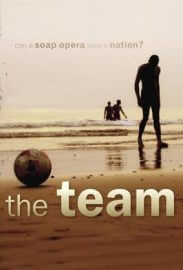
https://www.filmplatform.net/product/the-team
Following Kenya’s 2007 Presidential election, which threatened to push the country to civil war, the international community intervened and a fragile peace was brokered. An alternative local response is the creation of a taboo-breaking TV soap opera, “The Team,” following the struggles of a co-ed multi-ethnic football squad to overcome their differences, both on and off the pitch. There’s inherent drama behind any TV production: will deadlines be met; will it be good? But here the stakes are exponentially higher: if you don’t captivate an audience, you risk losing your country.

I’ve had the pleasure and challenge of making a number of films in various parts of Africa, travelling to Somalia; Lesotho; Democratic Republic of Congo; Rwanda; Malawi, Kenya, and so on.
These films—including “Shake Hands with the Devil,” and “Triage,” both with Peter Raymont of White Pine Pictures in Toronto, Canada—were neither easy to make, nor easy to watch. I was hardly suffering from “Africa fatigue,” but wanted to explore a different side of so-called African story: one that wasn’t about a Western outsider on a pilgrimage back to the past, or on a crusade into the future. Rather, a present story where Africans played the starring role, active participants instead of passive victims.
So, I was immediately intrigued when I heard that a Kenyan production company—borrowing an idea from the innovative US-based Non-Governmental Organization, Search for Common Ground—was creating a TV soap opera series called “The Team,” hoping to captivate an audience and compel their nation to confront issues like tribalism.
We started filming in December 2008—our first of four shoots in Kenya over the period of a year. As a thousand aspiring actors auditioned at Kenya’s national soccer stadium—an appropriate location since the soap opera follows a soccer team comprised of players from warring tribes—our crew was immediately struck by the idealism of the final cast: some had never acted before, all were from different backgrounds in terms of tribe (not the most politically correct term, but the one that they used) and class, but all seemed united in a common belief that what the soap opera might just change their nation, and would undoubtedly change their lives. Finally, I thought, here was my positive “African story” with a happy ending, more heart-warming than heartbreaking.
Well, without giving too much away, that was a bit of wishful thinking on my part. When the story took an unexpected turn at the end, I remember asking one of the young actors: “What happened? What about the whole “A Star is Born” kind of storyline?” He said: “Unfortunately, life is not a fairy-tale.” There’s no script for life, or documentary, and what happens, happens, for better or worse.
– Patrick Reed